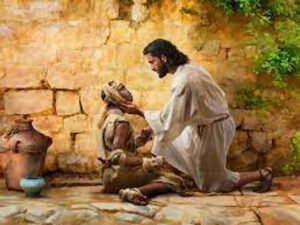Today is the optional memorial of Our Lady of Lourdes, superseded by the Sunday liturgy. Lourdes is the world’s centre of miraculous cures, and coincidentally two Readings of today focus on illness; they are replete with the word ‘leprosy’, a disease that for centuries awaited a cure. Like cancer today, leprosy would in the remote past send shivers down the spine. And much as we may think it has been eliminated, it continues to be a cause for concern, for where it was once eradicated, it has since resurfaced. The only difference is that while leprosy today is easily curable, perhaps the associated stigma is not. And few would realise that the stigma of sin is infinitely worse.
In the First Reading (Lev 13:1-2, 44-46) there is both the stigma and the pain. Moses, who was a member of the priestly tribe of Levi, was also the author of the Book of Leviticus. It is understandable that, at a time when physical abnormalities were attributed to sin, the Book should convey guidelines on how bodily diseases threatening society had to be handled. But we have to also capture the message of divine forgiveness and obligation of human sanctification that the Book contains.
Alas, how despicable was the treatment meted out to lepers; in fact, that was no treatment but condemnation! A leper’s distinguishing mark was torn clothes, hair hanging loose, lips veiled, and the cry, ‘Unclean, unclean’. He was not only regarded as unclean, he would be in that condition, alone, nameless and forgotten, in a habitation outside the residential areas, until Death took pity on him. Let those who baulk also remember what, not so long ago, victims of the much-hyped covid-19 were made to feel….
That is to say, our fallen nature remains unchanged – until we are touched by the Lord of Hosts, who is none other than Jesus Christ. It is evident from the Gospel text (Mk 1: 40-45) that He had both the compassion to reach out and the power to cure whoever needed His help – and who doesn’t? When the leper beseeched Him – ‘If you will, You can make me clean,’ Jesus was moved by pity; He did not stand on ceremony, but went ahead and cured him – ‘I will; be clean!’ He said. And the cure was powerful, instantaneous, undoubtedly supernatural.
Yet, He charged the man to say nothing to anyone but the priest. He makes a reference to Moses: ‘… and offer for your cleansing what Moses commanded, for a proof to the people.’ The proof consisted in changing his life for the better – his sanctification – what could be a greater proof that the Lord had touched him? In fact, Jesus did not want anyone to proclaim Him lest others should think that His Kingdom was of this world; He had not come to liberate their country but their souls. It is quite another matter that the man who was cured went out and talked freely about Jesus… What do we do? The unclean became clean; no wonder there was joy in his heart and a spring in his step. What about us?

Who on earth has the power to cure moving corpses? Only Our Lord Jesus Christ: He washed away not only the pain but the stigma too. Quite significantly, St Lazarus – from Jesus’ parable of the wicked rich man (Lk 16: 19-31) – is the patron of lepers and against leprosy. Closer to our times, in Goa, St Francis Xavier would say Mass at the leper home in the suburbs of the old city on Sundays and tend their wounds with his own bare hands. In Sri Lanka, the same was true of St Joseph Vaz, who provided a healing touch to lepers and cholera patients alike.
Yet the disease did not touch those messengers of love. Of course, there is, on the other hand, the story of the Belgian missionary Fr Damien who worked in a Hawaiian leper colony, where he contracted leprosy himself. Similarly, in a secular setting, haven’t we heard of cancer specialists that have died of cancer, and paediatricians who have remained childless? That is the mystery of life. None can rightfully demand a miracle or even expect any sort of supernatural immunity.
Hence, St Paul’s formula in today’s Second Reading (1 Cor 10: 31 – 11: 1): he exhorts us to do everything for the greater glory of God. We have to win others over and let them be saved. In the remote past, even a lesser skin disease was feared for its uncleanliness, in our days, it is our stubborn sinfulness that must be feared. We ought to have faith and seek mercy at all times, from Jesus who is the Bread of Life. We are no more than moving corpses awaiting His miraculous cures.
Dear Oscar, thank you for sharing that article that leads us to think and love God. May Our Lady of Lourdes in her day make you and your family more pious and holy every day.
You give us supernatural hope in these troubled times. Thank you Mr. Oscar